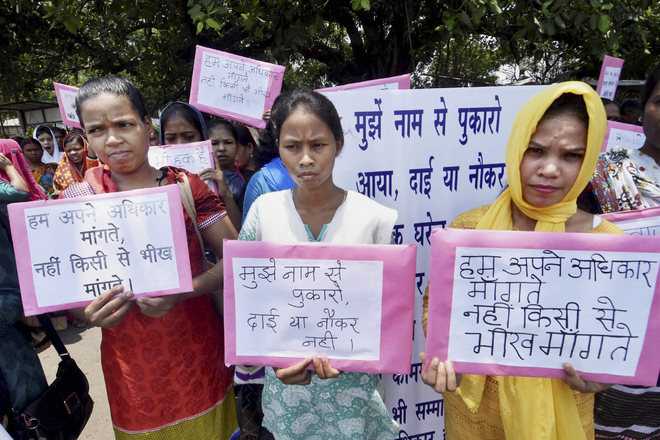
The calmwali bai: When it comes to domestic help, many progressive people, who critique feudalism and the serfdom of rural peasants, underpay and overwork those very rural peasants when they hire them in the city as maids Photo:PTI
Aradhika Sharma
The huge chasm between domestic help and their employers was recently in news when there was a standoff between the residents the Mahagun Moderne Housing Complex in Noida and the residents of the nearby shanty town. This standoff makes Tripti Lahiri’s book even more relevant in today’s circumstances.
Lahiri writes with journalistic precision and insight about India’s ultimate labour saving devices — the ubiquitous maid. The scope of the study is Delhi and its surrounding areas. Well researched, the book is an in depth examination of the backgrounds and settings that the Delhi maids come from; the households that they serve; their pay, perks and lifestyles that vary from household to household.
Some stories are positive, while many deal with the hypocrisy of the employers, many of whom entrust their most precious possessions into the care of these helpers — their homes and their children. Many people in India, especially working couples, who can afford the services of a household help, do employ maids. However, the peculiar character of a city like Delhi can turn people, especially those who work for you in menial jobs, into commodities. It is said that the kind of a person you are is defined by the way you treat those who are bound to serve you. But many don’t really care about definitions in the context of their household maids.
Lahiri says in her introduction: “…when it comes to domestic help, many progressive people have a blind spot. Professors, who study and critique feudalism and the serfdom of rural peasants, underpay and overwork those very rural peasants when they hire them in the city as maids; feminists who are fighting the patriarchy nitpick and circumscribe the autonomy of their maids… “
The topic was excellently explored in Tate Taylor’s award winning film, The Help (2011) in the context of civil rights movement of the 1960s about African-American maids and the struggles they face on a daily basis. Since then, the unwritten rules that dictated the conduct of women, demarcating the clear lines between the mistress and the maid may have blurred in the Western countries, but are very much in place in India.
It is a fact that historically, India has had a lopsided sharing of work between the man and the woman of the household. Now with more and more women joining the workforce and the skewed distribution still in place, the maid and the nanny are a mandatory requirement for the smooth functioning of the work-life balance of a family. Thus, there has been a mushrooming of the agents who will procure these women for you. Lahiri has devoted a full section of the book to these agents, who obtain servants and nannies to supply to homes, some of which employ up to 25 of them.
The girls come to Delhi from Jharkhand, Orissa, Bengal and the North East in the hope of escaping the daily grind of eking a few grains to keep body and soul together. The city seems to be an infinitely better choice. However, in the case of women like Golbanu Bibi of Doparia, the choice brought her nothing but abuse and death at the hands of her employer. Or like Irma’s daughter, who went into domestic service almost 10 years ago and has hardly accrued any wages (when this book was written) yet, but still chose the slavery of the employer’s household rather than return to the village with her mother.
There are some positive stories as well like that of Sonal Sharma, a sociologist at The Centre for Policy Research in Chanakyapuri. Sonal’s home address is the servant quarters of government housing area but he has broken out of the mould of deference and self-effacement that his parents were cast in and pursued his dreams.
Lovely Khan of Malda started her career at the age of 14 as a cook and cleaner, but was determined to better herself. She got herself a job as a marketer and she covets a job at a mall which will firmly place her in the category of a white collar worker.
Still, there is an undeniable and inherent balance of power that tilts in favour of the employer. There are some cases wherein the employer is kind and humane, but Lahiri documents that such cases are not the norm.
At the end of the day, however, the employer needs the employee and vice versa and if the episode that was witnessed by the Noida residents is not to be repeated, then they must recognise that need and coexist with mutual respect.



























